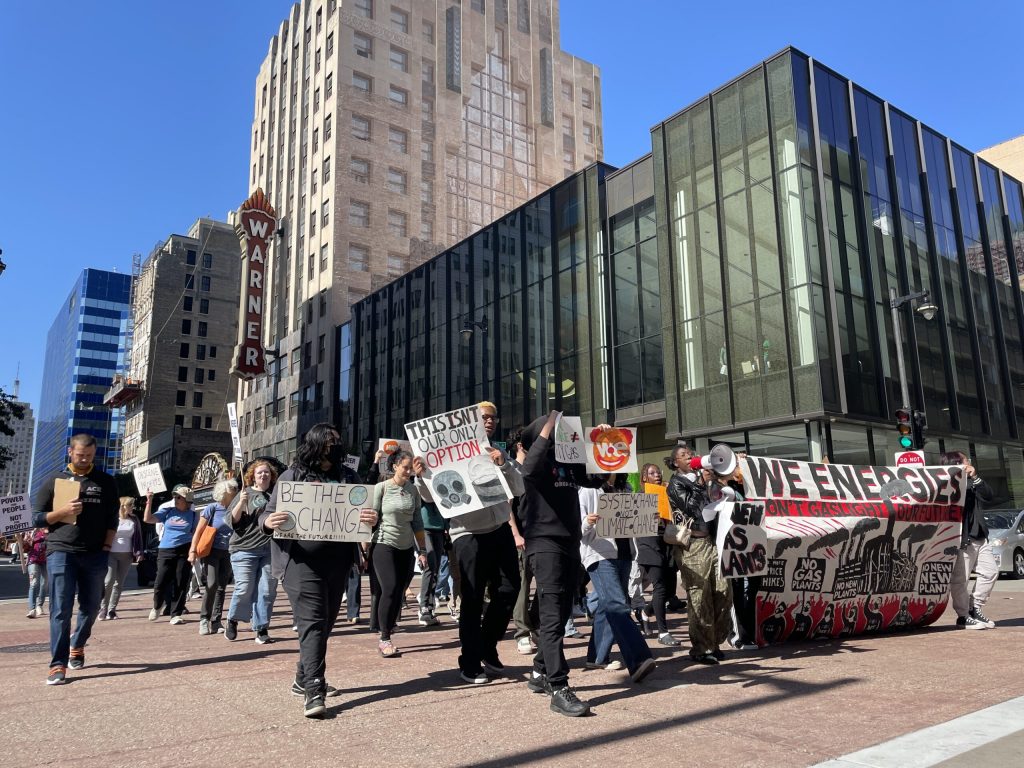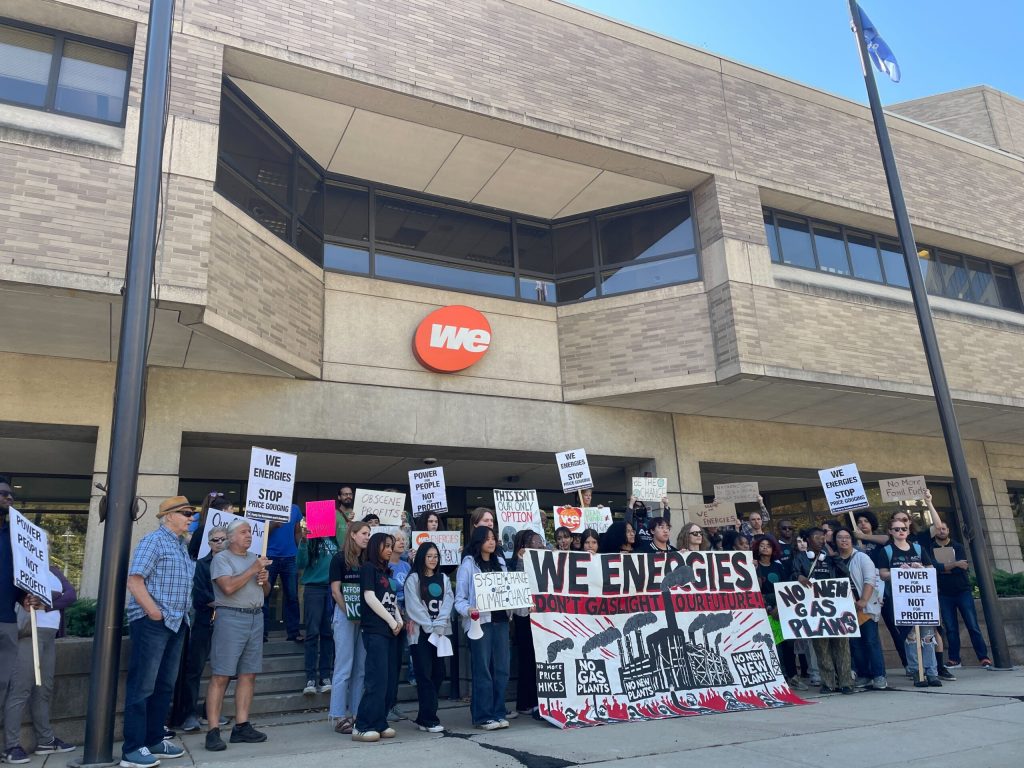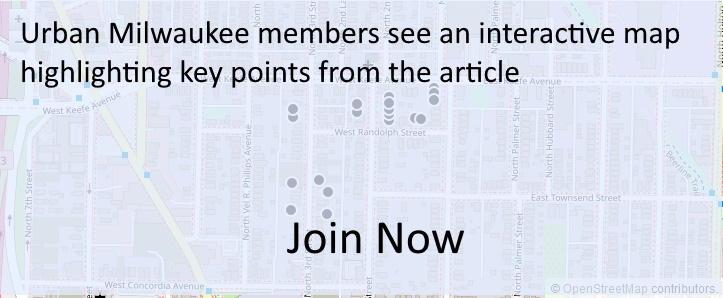Group Opposes We Energies Rate Increases, Marches To Public Hearing
Protesters called for more renewable energy. Utility says rates are part of renewable transition.

People protest We Energies’ proposed 2025-26 rate increases in downtown Milwaukee, Oct. 3, 2024. Nick Rommel/WPR
Aaron Muehlbauer bought a house in Milwaukee’s Metcalfe Park neighborhood two years ago. With the house came energy bills from We Energies.
“Each year, it does seem like it’s rising tremendously,” she said.
“Even with the WiFi, we need energy for school, for computers,” she said.
Though she’s been able to pay all her energy bills so far, she said it’s “a big struggle” for her at the moment.
Muehlbauer attended one of the Public Service Commission’s public hearings in Milwaukee Thursday on proposed rate increases by We Energies and Wisconsin Public Service. The two utilities — which serve much of eastern Wisconsin — are both owned by WEC Energy Group.
2025 would see third straight year of rate increases
Earlier this year, the company proposed rate increases for 2025 and 2026.
We Energies, which covers much of southeastern Wisconsin, requested a 6.9 percent increase to its electric rates in 2025 and a 4.6 percent increase in 2026. WPS, serving northeastern Wisconsin, hopes to raise electricity rates by 8.5 percent in 2025 and 4.9 percent in 2026.
In a brief filed with the PSC, consumer advocate group Citizens Utility Board wrote that the rate changes would see a “typical” customer paying 36 percent, or $40, more for electricity in January 2026 than in December 2022.
The increases would deliver around $800 million to the two companies.
Brendan Conway, a spokesperson for both utilities, said higher rates will pay for two new solar farms, Environment Protection Agency regulation compliance measures and power outage prevention.
Protestors call out unequal impact of rate hikes, natural gas emissions
Before the afternoon hearing Thursday, about 50 protestors gathered in Zeidler Union Square, a park in front of We Energies’ Milwaukee offices.
They were protesting the rate increases and calling on the utilities not to build more natural gas plants.
The group marched to the downtown hotel where the hearing took place.
During a press conference at the hotel’s doors organized by Action for the Climate Emergency, Milwaukee County District Eight Supervisor Steven Shea agreed with their demands.
“My ancient ancestors worshiped the sun, as did many ancient peoples. And although I don’t worship the sun myself, they did have a kernel of truth behind them,” Shea said, arguing for solar energy.

People protest We Energies’ proposed 2025-26 rate increases in downtown Milwaukee, Oct. 3, 2024. Nick Rommel/WPR
Melody McCurtis, deputy director of activist group Metcalfe Park Community Bridges, said high energy costs have deadly results in the group’s namesake high-poverty community.
“When the summer hits, and We Energies cuts folks’ lights off, they’re going to the hospital or they’re dying because they can’t cool off inside their homes,” McCurtis said, calling for “free energy.”
Muehlbauer, the Metcalfe Park homeowner, said both things happened on her block this summer: a senior died from heat exhaustion and the power went out twice.
Conway said the most common reason for power outages on clear days are outdated equipment, falling branches and wildlife.
Increases pay for already-approved projects
Conway said that, under Wisconsin law, rate increases can only pay for energy facilities that have already been built: the Paris Solar-Battery Park in Kenosha County and the Darien Solar Energy Center in Rock and Walworth Counties. Both facilities are supposed to go online in 2024.
He said rate increases in 2025 and 2026 cannot pay for upgrades to natural gas facilities in Paris and for a new natural gas plant in Oak Creek.
Conway said that when EPA mandated carbon capture on coal plants running after 2032, WEC moved the closing date of the Oak Creek Power Plant to 2025. He said this accelerated closing accounts for part of the increase.
Finally, he said WEC is mitigating weather-related power outages by burying power lines, trimming hazardous trees and “sectionalizing” the power grid.
Conway said he expects rate increases to slow down long-term as WEC continues transitioning from costlier fossil fuel plants to new renewable energy facilities.
“Once you get these large solar farms up and running — so there’s a cost to build those — but once those go into service, very few employees there, the maintenance is fairly low-level because there are not a lot of moving parts, and the fuel’s free — it’s the sun,” he said.
The Public Service Commission will rule on the proposed rate increases by the end of the calendar year.
Public weighs in on potential We Energies, WPS rate increases was originally published by Wisconsin Public Radio.

Existing members must be signed in to see the interactive map. Sign in.
If you think stories like this are important, become a member of Urban Milwaukee and help support real, independent journalism. Plus you get some cool added benefits.





















